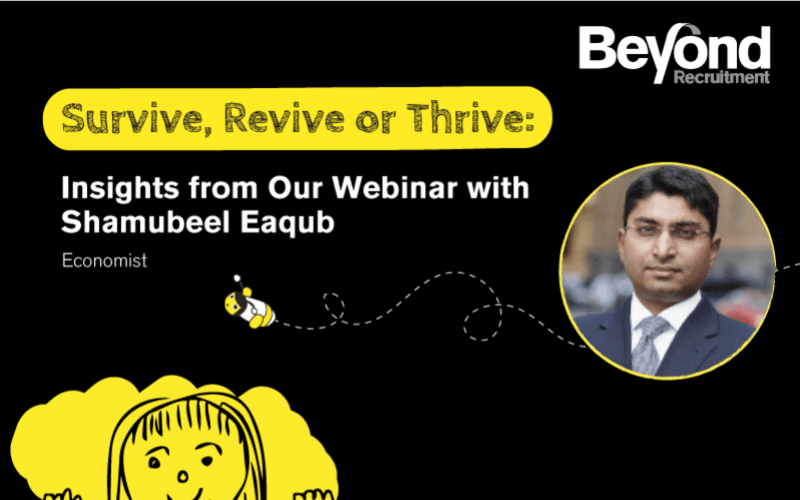During times of uncertainty, having access to the right information can mean the difference between surviving or thriving – and never has this been truer than in the unprecedented year that was 2020.
In our latest webinar, our CE, Liza Viz, introduced the Beyond Recruitment Economic & Labour Report 2020/21, supported by in-depth commentary from Economist Shamubeel Eaqub on the current state of the economy, the impact of COVID-19, and trends and predictions for the future of the New Zealand labour market.
Below is a summary of the key takeaways from the session to help understand New Zealand's increasingly complex business environment under the influence of COVID-19.
An Unprecedented Response
We have just experienced one of the biggest inflection points in our lifetimes, with extraordinary disruption to economic activity, jobs and our daily lives. This has led to an unprecedented response across various aspects of our society, transforming not just how we live, work and do business, but the way we think about the economy in terms of what can change and how quickly.
Key Takeaways:
There has been unprecedented public health, political and fiscal responses and, overall, we are doing pretty well as a result, with most activity almost back to pre-COVID-19 levels.
However, we are seeing an unusual recession in that things are not moving in sync – instead, there is incredible volatility with pain points focused in specific areas, likely resulting in a longer and more lingering economic event than we’ve experienced in the past.
One of the lasting points of disruption is imports, which resulted in places like Auckland, Wellington and Queenstown being hit hard while other parts of the economy continued to grow, largely due to the resilience of exports (e.g. dairy, fruit).
We are likely to see a shift in the way the government operates in the economy, replacing the Central Bank and becoming more interventionist around industrial policy, regional policy, immigration and the economic cycle.
Impact on the Labour Market
The labour market has changed significantly over the past 10 months, with COVID-19 having varying effects across different industries, occupations, provinces and urban centres. And while the long-term impacts are yet to be seen, the responsibility is on us as employers, businesses and colleagues to create a sustainable employment environment for the future.
Key Takeaways:
There hasn’t been an even story in terms of ramifications in the employment market. We have seen concentrated pain for some and pretty good conditions for others, with job losses clustered in specific areas such as people under 30, retail, tourism and administration.
Despite the job losses, labour shortages continue, in part due to the decrease in net migration. Consequently, we will need to think more about developing talent and career progression than we have previously.
COVID-19 triggered the widespread adoption of remote working practices, but now that the immediacy is over, businesses must look to strike the right balance for their employees, communities and the organisation as a whole.
Lessons From COVID-19
Once COVID-19 ends and a vaccine is distributed, we will go back to some kind of normal, but that normal is going to look very different from what we are used to. The way we manage the economy will be different, what we expect of politicians will be different, and how we work and do business will have evolved drastically. There are a number of lessons we can take with us from this period which will make us more resilient and adaptable in our businesses, careers and lives.
Key Takeaways:
As leaders, if we want people to go along with us through change, we have to trust them with detailed concepts and we have to communicate them well – that’s the way we build trust, cohesion and culture.
When COVID-19 hit, we thought there would be a tradeoff between economic growth and health outcomes, but what we saw was that a good health response was also the right response in terms of the economy.
With the border closed and the economy continuing to function, this changed perceptions around how open our communities should be, highlighting the value of the homegrown and domestic.
COVID-19 has made it clear that we can never accurately forecast the future, so detailed scenario planning and stress testing will allow businesses to better respond, look after their people and maintain their culture during extreme events.
Summary
This is just a glimpse of what was covered in the webinar – we encourage you to click below and view the recording and presentation slides to get a full picture of the economic insights.

For a comprehensive look into the talent strategies of New Zealand businesses adjusting to change in the current disruptive economic landscape, as well as how COVID-19 affected salaries/rates within specific industries and occupations, click the button below to download your exclusive copy of our Beyond Recruitment Economic & Labour Report 2020/21.

If you have any questions regarding the webinar or report, or would like to find out how we can support you and your business during this time, please don’t hesitate to reach out.



.png)

